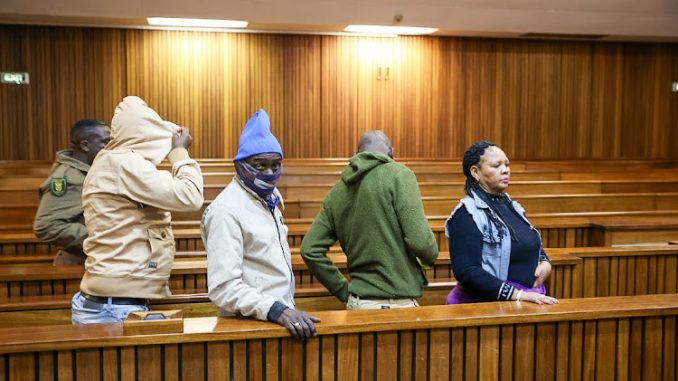Female professor Mamta Pathak to spend life in prison for killing husband her husband.
• How she tried in vain to convince court that she didn’t
Are you a chemistry professor?” the judge asked.
“Yes,” Mamta Pathak replied, clasping her hand in a respectful namaste.
Draped in a white sari, glasses perched on her nose, the retired college teacher stood before two judges in a courtroom in the central Indian state of Madhya Pradesh, speaking as if delivering a forensic chemistry lecture.
“In the post-mortem,” she argued, her voice trembling but composed, “it is not possible to differentiate between a thermal burn and an electric burn mark without proper chemical analysis.”
Across the bench, Justice Vivek Agarwal reminded her, “The doctor who conducted the post-mortem said there were clear signs of electrocution.”
It was a rare, almost surreal moment – a 63-year-old woman, accused of murdering her husband by electrocution, explaining to the court how acids and tissue reactions revealed the nature of a burn.
The exchange, caught on video during her April hearing, went viral in India and stunned the internet. But in the court, no amount of expert-like confidence could undo the prosecution’s case – a spouse murdered and a motive rooted in suspicion and marital discord.
Last month the High Court dismissed Mamta Pathak’s appeal and upheld her life sentence for the April 2021 murder of her husband, Neeraj Pathak, a retired physician.
While Pathak mounted a spirited, self-argued defence – invoking gaps in the autopsy, the insulation of the house, and even an electrochemical theory – the court found the circumstantial evidence conclusive: she had drugged her husband with sleeping pills and then electrocuted him.
In court, Mamta, a mother of two, had peered over a stack of overflowing case files, leafing through them before she grew animated.
“Sir, electric burn marks can’t be distinguished as ante-mortem [before death] or post-mortem [after death],” she argued quoting from a forensics book.
“How did they [doctors] write it was an electric burn mark in post-mortem [report]?”
Microscopically, electrical burns look the same before and after death, making standard examination inconclusive, say experts. A close study of dermal changes may reveal whether a burn was ante- or post-mortem, according to one paper.
An impromptu exchange on chemical reactions followed, with the judge probing her on laboratory processes. Mamta spoke about different acids, explaining that distinctions could be made using an electron microscope – something not possible in a post-mortem room. She tried to walk the judge through electron microscopy and different acids. Three women lawyers in the background smiled.
Mamta ploughed on – she said she had been studying law in prison for a year. Flipping through her tabbed files with stickers and quoting from forensic medicine books, she pointed to alleged gaps in the investigation – from the unexamined crime scene to the absence of qualified electrical and forensic experts at the scene of the crime.
“Our house was insured from 2017 to 2022, and inspections confirmed it was protected against electrical fire,” she said.
Mamta told the court that her husband had high blood pressure and heart disease. She stated the actual cause of death was narrowing and “calcification of his coronary arteries due to old age”. She also suggested he may have slipped and sustained a hematoma, but no CT scan was conducted to confirm this.
Neeraj Pathak, 65, had been found dead at the family home on 29 April 2021. The autopsy ruled electrocution as the cause of death. Days later, Mamta had been arrested and charged with murder.
Police had seized an 11-meter electric wire with a two-pin plug, and CCTV footage from the couple’s house. Six tablets of a sleeping pill were recovered in a strip of 10.
The postmortem report cited cardiorespiratory shock from electrical current at multiple sites as the cause of death, occurring 36 to 72 hours before the autopsy conducted on 1 May.
“But they didn’t find my fingerprints on the strip of tablets,” Mamta told the judges.
But her arguments quickly unravelled, leaving Judges Agarwal and Devnarayan Sinha unconvinced.
For nearly four decades, Mamta and Neeraj Pathak had lived a seemingly orderly middle-class life in Chhatarpur – a drought-prone district of Madhya Pradesh known for its farms, granite quarries, and small businesses.
She taught chemistry at the local government college; he was the chief medical officer at the district hospital. They raised two sons – one settled abroad, the other, sharing a home with his mother. Neeraj retired voluntarily in 2019 after 39 years as a government doctor and then opened a private clinic at home.
The incident happened during the pandemic. Neeraj was showing Covid symptoms and kept to the first floor. Mamta and her son, Nitish, stayed downstairs. Two staircases from the ground floor linked Neeraj’s rooms to the open gallery and waiting hall of his private clinic, where half a dozen staff bustled between the lab and the medical store.
The 97-page judgment stated that Mamta reported finding her husband Neeraj unresponsive in his bed on 29 April, but did not inform a doctor or the police until 1 May. Instead, she took her elder son to Jhansi – over 130km away – without clear reason, according to the driver, and returned the same evening. She claimed ignorance about how he died when she finally alerted the police.
Beneath this silence lay a troubled marriage. The judges highlighted longstanding marital discord, with the couple living apart and Mamta suspecting her husband of infidelity.
On the morning of the day he died, Neeraj had called an associate, alleging that Mamta was “torturing him,” locking him in a bathroom, withholding food for days, and causing physical injuries. He also accused her of taking cash, ATM cards, vehicle keys, and bank fixed deposit documents. Pleading for help, Neeraj’s son contacted a friend who alerted the police, who then rescued the retired doctor from what was described as “Mamta’s custody”.
The couple had even lived apart in recent times, adding weight to the court’s doubts.
Mamta had told the court she was the “best mother,” presenting a birthday card from her children as proof. She also showed photos of herself feeding her husband and snapshots with family.
Yet, the judges were unmoved. They noted that such tokens of affection didn’t erase motive – after all, a “doting mother” can also be a “suspicious wife,” they said.
Fifty minutes into her deposition, after parrying questions and defending herself against the court’s doubts, Mamta’s composure faltered for the first time.
“I know one thing… I did not kill him,” she said, her voice trailing off.
At another moment, she confessed, “I can’t take this very much more.”
Trying to ease the tension, Judge Agarwal remarked, “You must be used to this… you must be taking classes for 50 minutes in college.”
“Forty minutes, sir. But they are small children,” Mamta said.
“Small children in college? But your designation is assistant professor,” the judge pressed.
“But they are kids, sir,” she replied.
“Don’t tell us such stories,” Judge Agarwal interrupted sharply.
Mamta fought not just as a defendant, but as a teacher turning the courtroom into a chemistry lab – hoping to prove her innocence through science. Yet in the end, the cold facts proved stronger than her lessons. BBC









